成人高等教育学士学位英语水平考试复习指导
成人高等教育学士学位英语考试复习要点
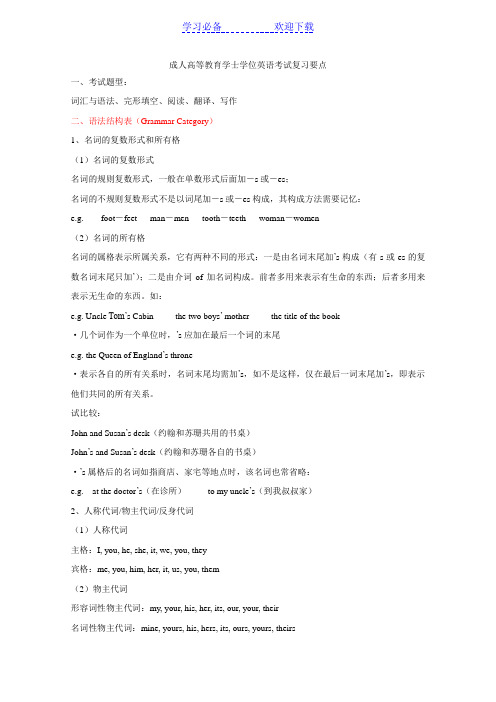
成人高等教育学士学位英语考试复习要点一、考试题型:词汇与语法、完形填空、阅读、翻译、写作二、语法结构表(Grammar Category)1、名词的复数形式和所有格(1)名词的复数形式名词的规则复数形式,一般在单数形式后面加-s或-es;名词的不规则复数形式不是以词尾加-s或-es构成,其构成方法需要记忆:e.g. foot-feet man-men tooth-teeth woman-women(2)名词的所有格名词的属格表示所属关系,它有两种不同的形式:一是由名词末尾加’s构成(有-s或-es的复数名词末尾只加’);二是由介词of加名词构成。
前者多用来表示有生命的东西;后者多用来表示无生命的东西。
如:e.g. Uncle Tom’s Cabin the two boys’ mother the title of the book·几个词作为一个单位时,’s应加在最后一个词的末尾e.g. the Queen of England’s throne·表示各自的所有关系时,名词末尾均需加’s,如不是这样,仅在最后一词末尾加’s,即表示他们共同的所有关系。
试比较:John and Susan’s desk(约翰和苏珊共用的书桌)John’s and Susan’s desk(约翰和苏珊各自的书桌)·’s属格后的名词如指商店、家宅等地点时,该名词也常省略:e.g. at the doctor’s(在诊所)to my uncle’s(到我叔叔家)2、人称代词/物主代词/反身代词(1)人称代词主格:I, you, he, she, it, we, you, they宾格:me, you, him, her, it, us, you, them(2)物主代词形容词性物主代词:my, your, his, her, its, our, your, their名词性物主代词:mine, yours, his, hers, its, ours, yours, theirs(3)反身代词(指一个动作回射到该动作执行者本身,表强调或加强语气)myself, yourself, himself, herself. Itself, ourselves; yourselves, themselves, oneselfe.g. Please help yourself to some tea.I want to speak to the director himself.3、句子和句子成分Sentence是具有主语部分和谓语部分并有完整意义的可以独立的一组词。
英语学士学位考试技巧

英语学士学位考试技巧首先了解考试题型。
学位英语考试用书要反复阅读。
阅读理解分值大,是复习的重点,多学习,掌握关键词,学会模糊阅读,了解短文大意,不必纠结于各别生词的意思。
阅读理解分值大,是复习的重点,多学习,掌握关键词,学会模糊阅读,了解短文大意,不必纠结于各别生词的意思。
重视写作题。
分值重。
依据题意,列个题纲,一、二、三自然段。
每一段写三到四句,总篇幅也说十来句话。
留意试卷中的语句和词语,有时可引用,以丰富词汇。
要求字迹要工整,尽量少涂改。
还有完型填空,尽量复习时多阅读教材,了解词的用法,能记住记住,记不住有个印象,还是好的。
毕竟,课本上的原题有50份左右。
最后是选词填空。
一个0.5分,30个。
有时间做就做,没时间就蒙吧。
一般时选全选B、C得个一半以上的分是不成问题。
、2成人学位英语考试答题技巧一、单项选择题考查覆盖面通常较广,涉及动词及动词短语、时态语态、从句、非谓语动词、倒装、主谓一致、交际用语等,这部分试题也很少是单个的句子,大多为并列句或复合句,因此我们应学会依据语篇知识来掌握答题技巧,尤其是要注意句子之间的解释、对比、转折、因果等关系。
1.利用动词词组中的介词或副词确定正确选项2.利用动词词组中的动词确定选项3.释义参照型+近义词二、完型填空答完形填空题有一定的技巧。
每一段会有一个词,是意图与你分享情感、态度、价值观的核心所在,一般来说,第一段说的是全文的故事,有中心概括全文,然后一层一层往下讲。
所以第一段的题可以慢一点做。
每一段第一句都有一个特点:是一个主题句,中间有一个名词。
完型填空解题四步法原则:第一步:跳读。
第二步:跳读。
第三步:推敲。
第四步:复查。
应试技巧一:语境信息解题法:考生应具有通过上下文提示、暗示或铺垫,对篇章进行整体上的把握的能力。
应试技巧二:语法结构法:这类题必须要考生能够从句式的结构上辨认出须填相关的关联词、连词、副词、形容词或相应的动词,当然还要合计到主谓一致的关系等语法知识要点。
2023年成考专升本英语答题技巧和方法
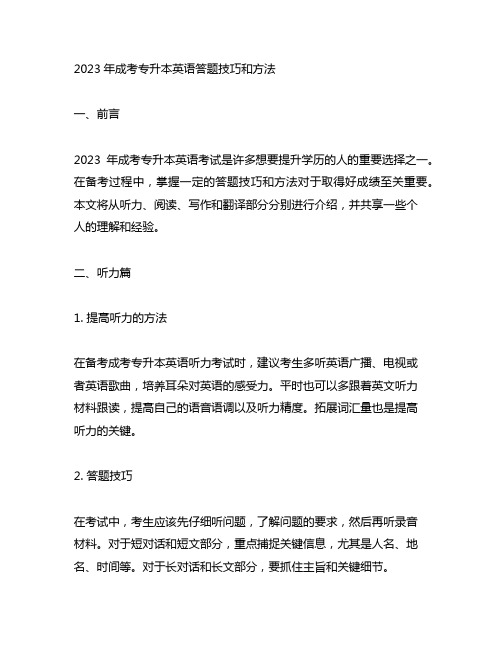
2023年成考专升本英语答题技巧和方法一、前言2023年成考专升本英语考试是许多想要提升学历的人的重要选择之一。
在备考过程中,掌握一定的答题技巧和方法对于取得好成绩至关重要。
本文将从听力、阅读、写作和翻译部分分别进行介绍,并共享一些个人的理解和经验。
二、听力篇1. 提高听力的方法在备考成考专升本英语听力考试时,建议考生多听英语广播、电视或者英语歌曲,培养耳朵对英语的感受力。
平时也可以多跟着英文听力材料跟读,提高自己的语音语调以及听力精度。
拓展词汇量也是提高听力的关键。
2. 答题技巧在考试中,考生应该先仔细听问题,了解问题的要求,然后再听录音材料。
对于短对话和短文部分,重点捕捉关键信息,尤其是人名、地名、时间等。
对于长对话和长文部分,要抓住主旨和关键细节。
三、阅读篇1. 阅读技巧成考专升本英语阅读部分主要考察考生的阅读理解能力。
在备考阶段,考生需要多读英文文章,注重培养对文章结构和逻辑的理解能力。
也要注重积累词汇量和短语搭配,以便更好地理解文章内容。
2. 解题方法在阅读理解的解题过程中,考生要仔细阅读问题和选项,理清问题的要求,然后有选择性地阅读文章内容,找出问题的答案。
对于多选题和判断题要格外小心,避免被干扰项所迷惑。
四、写作篇1. 作文结构成考专升本英语写作部分一般包括作文和翻译两个部分。
在备考时,考生需要掌握好作文的基本结构,包括引言、正文和结论。
要注意段落间的衔接和逻辑,尽量展现自己良好的逻辑思维能力。
2. 写作技巧在作文部分,考生要注意选择合适的论据和例子支撑自己的观点,同时要避免语法错误和逻辑不严谨的问题。
在翻译部分,考生要注重句型转换和词语替换的技巧,同时要注意上下文的呼应和连贯。
五、总结篇2023年成考专升本英语考试是一个全面考察英语能力的考试。
在备考过程中,考生需要注重听力、阅读、写作和翻译四个方面的技巧和方法。
平时的积累和练习也是取得好成绩的重要保障。
六、个人观点在备考成考专升本英语考试时,我认为最重要的是平时的积累和练习。
广东成考学位英语技巧
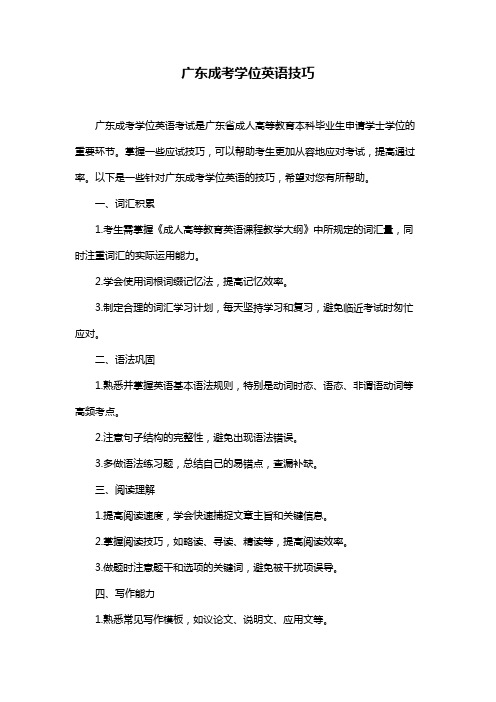
广东成考学位英语技巧广东成考学位英语考试是广东省成人高等教育本科毕业生申请学士学位的重要环节。
掌握一些应试技巧,可以帮助考生更加从容地应对考试,提高通过率。
以下是一些针对广东成考学位英语的技巧,希望对您有所帮助。
一、词汇积累1.考生需掌握《成人高等教育英语课程教学大纲》中所规定的词汇量,同时注重词汇的实际运用能力。
2.学会使用词根词缀记忆法,提高记忆效率。
3.制定合理的词汇学习计划,每天坚持学习和复习,避免临近考试时匆忙应对。
二、语法巩固1.熟悉并掌握英语基本语法规则,特别是动词时态、语态、非谓语动词等高频考点。
2.注意句子结构的完整性,避免出现语法错误。
3.多做语法练习题,总结自己的易错点,查漏补缺。
三、阅读理解1.提高阅读速度,学会快速捕捉文章主旨和关键信息。
2.掌握阅读技巧,如略读、寻读、精读等,提高阅读效率。
3.做题时注意题干和选项的关键词,避免被干扰项误导。
四、写作能力1.熟悉常见写作模板,如议论文、说明文、应用文等。
2.注意文章结构的合理性,开头、主体和结尾要层次分明。
3.多练习写作,积累常用句型和表达方式,提高写作水平。
五、听力训练1.提高听力水平,多听英语广播、新闻、电影等。
2.做听力题时,注意抓住关键信息,如数字、地点、人名等。
3.培养预测能力,根据题干和选项推测听力材料的大致内容。
六、模拟考试1.定期进行模拟考试,熟悉考试流程和题型。
2.分析模拟考试中的错误,总结经验教训,不断提高应试能力。
3.调整心态,树立信心,以最佳状态迎接考试。
总之,广东成考学位英语考试需要考生在词汇、语法、阅读、写作和听力等方面进行全面复习。
通过以上技巧的运用,相信考生们能够在考试中取得理想的成绩。
成人学位英语备考复习建议
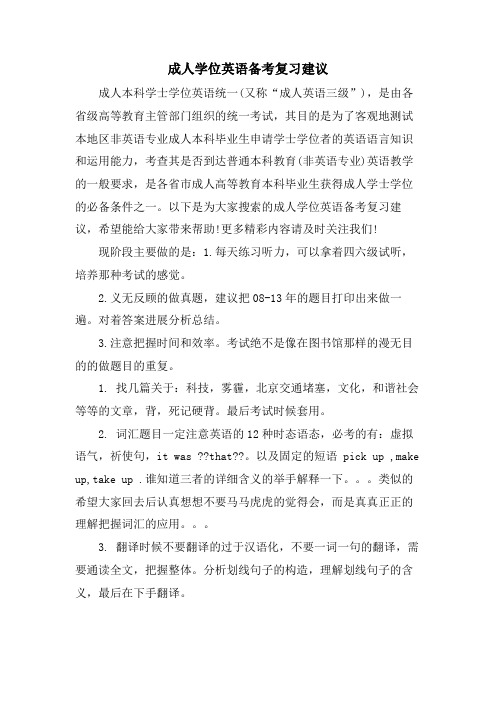
成人学位英语备考复习建议成人本科学士学位英语统一(又称“成人英语三级”),是由各省级高等教育主管部门组织的统一考试,其目的是为了客观地测试本地区非英语专业成人本科毕业生申请学士学位者的英语语言知识和运用能力,考查其是否到达普通本科教育(非英语专业)英语教学的一般要求,是各省市成人高等教育本科毕业生获得成人学士学位的必备条件之一。
以下是为大家搜索的成人学位英语备考复习建议,希望能给大家带来帮助!更多精彩内容请及时关注我们!现阶段主要做的是:1.每天练习听力,可以拿着四六级试听,培养那种考试的感觉。
2.义无反顾的做真题,建议把08-13年的题目打印出来做一遍。
对着答案进展分析总结。
3.注意把握时间和效率。
考试绝不是像在图书馆那样的漫无目的的做题目的重复。
1. 找几篇关于:科技,雾霾,北京交通堵塞,文化,和谐社会等等的文章,背,死记硬背。
最后考试时候套用。
2. 词汇题目一定注意英语的12种时态语态,必考的有:虚拟语气,祈使句,it was ??that??。
以及固定的短语 pick up ,make up,take up .谁知道三者的详细含义的举手解释一下。
类似的希望大家回去后认真想想不要马马虎虎的觉得会,而是真真正正的理解把握词汇的应用。
3. 翻译时候不要翻译的过于汉语化,不要一词一句的翻译,需要通读全文,把握整体。
分析划线句子的构造,理解划线句子的含义,最后在下手翻译。
4. 作文,选择生动的拓词,长短句的穿插使用,句子开头的多样化,句子构造的丰富化。
最重要的是观点切题,构造合理。
5. 总而言之还是需要多做题,按照时间多做题目,没有其他的技巧。
慢工出细活。
6. 要自信,只要过了4级的,就没有问题,肯定可以考的很好的。
1,做你没做过的事情叫成长,做你不愿意做的事情叫改变,做你不敢做的事情叫突破。
2,如果你向神求助,说明你相信神的能力; 如果神没有帮助你,说明神相信你的能力。
3,随着年龄的增长,我们并不是失去了一些朋友,而是我们懂得了谁才是真正的朋友。
成人高考学位英语复习资料
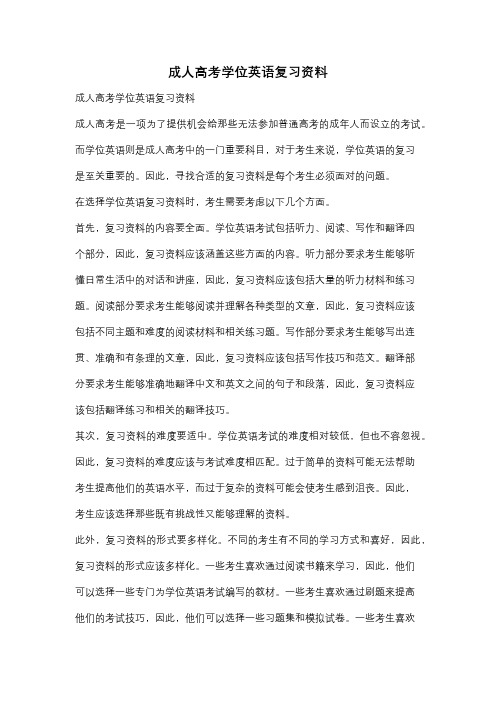
成人高考学位英语复习资料成人高考学位英语复习资料成人高考是一项为了提供机会给那些无法参加普通高考的成年人而设立的考试。
而学位英语则是成人高考中的一门重要科目,对于考生来说,学位英语的复习是至关重要的。
因此,寻找合适的复习资料是每个考生必须面对的问题。
在选择学位英语复习资料时,考生需要考虑以下几个方面。
首先,复习资料的内容要全面。
学位英语考试包括听力、阅读、写作和翻译四个部分,因此,复习资料应该涵盖这些方面的内容。
听力部分要求考生能够听懂日常生活中的对话和讲座,因此,复习资料应该包括大量的听力材料和练习题。
阅读部分要求考生能够阅读并理解各种类型的文章,因此,复习资料应该包括不同主题和难度的阅读材料和相关练习题。
写作部分要求考生能够写出连贯、准确和有条理的文章,因此,复习资料应该包括写作技巧和范文。
翻译部分要求考生能够准确地翻译中文和英文之间的句子和段落,因此,复习资料应该包括翻译练习和相关的翻译技巧。
其次,复习资料的难度要适中。
学位英语考试的难度相对较低,但也不容忽视。
因此,复习资料的难度应该与考试难度相匹配。
过于简单的资料可能无法帮助考生提高他们的英语水平,而过于复杂的资料可能会使考生感到沮丧。
因此,考生应该选择那些既有挑战性又能够理解的资料。
此外,复习资料的形式要多样化。
不同的考生有不同的学习方式和喜好,因此,复习资料的形式应该多样化。
一些考生喜欢通过阅读书籍来学习,因此,他们可以选择一些专门为学位英语考试编写的教材。
一些考生喜欢通过刷题来提高他们的考试技巧,因此,他们可以选择一些习题集和模拟试卷。
一些考生喜欢通过听力材料来提高他们的听力能力,因此,他们可以选择一些听力练习和录音材料。
总之,考生应该根据自己的学习方式和喜好选择合适的复习资料。
最后,复习资料的质量要可靠。
在选择复习资料时,考生应该选择那些有信誉和口碑的出版社和作者的资料。
这样可以确保复习资料的质量和准确性。
考生可以通过查阅相关的书评和评价来了解不同资料的质量。
成人教育(本科)《英语Ⅱ(1)》期末复习指导
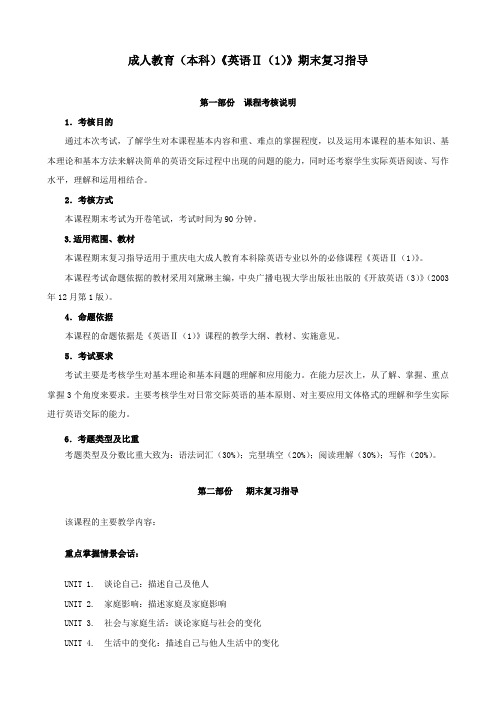
成人教育(本科)《英语Ⅱ(1)》期末复习指导第一部份课程考核说明1.考核目的通过本次考试,了解学生对本课程基本内容和重、难点的掌握程度,以及运用本课程的基本知识、基本理论和基本方法来解决简单的英语交际过程中出现的问题的能力,同时还考察学生实际英语阅读、写作水平,理解和运用相结合。
2.考核方式本课程期末考试为开卷笔试,考试时间为90分钟。
3.适用范围、教材本课程期末复习指导适用于重庆电大成人教育本科除英语专业以外的必修课程《英语Ⅱ(1)》。
本课程考试命题依据的教材采用刘黛琳主编,中央广播电视大学出版社出版的《开放英语(3)》(2003年12月第1版)。
4.命题依据本课程的命题依据是《英语Ⅱ(1)》课程的教学大纲、教材、实施意见。
5.考试要求考试主要是考核学生对基本理论和基本问题的理解和应用能力。
在能力层次上,从了解、掌握、重点掌握3个角度来要求。
主要考核学生对日常交际英语的基本原则、对主要应用文体格式的理解和学生实际进行英语交际的能力。
6.考题类型及比重考题类型及分数比重大致为:语法词汇(30%);完型填空(20%);阅读理解(30%);写作(20%)。
第二部份期末复习指导该课程的主要教学内容:重点掌握情景会话:UNIT 1. 谈论自己:描述自己及他人UNIT 2. 家庭影响:描述家庭及家庭影响UNIT 3. 社会与家庭生活:谈论家庭与社会的变化UNIT 4. 生活中的变化:描述自己与他人生活中的变化UNIT 5. 抱负与理想:谈论成就及对未来职业的理想UNIT 6 1——5单元复习UNIT 7. 我爱我家:学习有关家庭居住情况的内容UNIT 8. 休闲活动与宠物: 学习有关休闲活动及宠物与人的关系UNIT 9. 奥运会: 了解奥运会的有关情况UNIT 10. 健康与休闲: 学习有关健身与饮食习惯的内容UNIT 11. 保健与健康: 学习有关公共卫生保健和旅行健康的内容UNIT 12 7——11单元复习UNIT 13. 学校教育: 学习有关英国学校教育的内容UNIT 14. 学习与学习方法:学习与继续教育和学习方式相关的内容UNIT 15. 城市生活:学习与城镇及其发展相关的内容UNIT 16. 犯罪与司法:了解有关犯罪与司法的内容UNIT 17. 和谐共处:了解多元文化及与不同风俗习惯相关的内容UNIT 18 13——17单元复习掌握语法:UNIT 1. 谈论过去谈论将来表示将来的时间状语用here/there及one避免重复定语从句表述看法UNIT 5. 过去完成时Travel/journey/ trip/voyage谈论性格与职业谈论将来UNIT 7. to need doingto need to doto have/get sth done描述方位、位置描述感觉描述外观ThereforeAlthoughHowever形容词和介词的搭配表示抱怨和道歉书信的写作UNIT 8. 表示数量to spend time doing现在完成进行时ForsinceUNIT 9. 一般过去时被动语态动名词真实条件句构词法(后缀)UNIT 10. 祈使句用should提出忠告虚拟条件句用虚拟条件句提出忠告UNIT 11. 现在进行时被动语态过去进行时被动语态间接引语UNIT 13. 情态动词表示义务if/when动名词与动词不定式UNIT 14. 非限定性定语从句将来完成时UNIT 15. 现在进行时被动语态现在完成时被动语态already/still/yetUNIT 16. 情态动词表示劝告反意疑问句表达因果关系动词与介词的搭配UNIT 17. 表达数量间接引语和间接问句反意疑问句tell/ask第三部分综合练习题I. Select the best answer from the options given.1. Mr.Wang is listening to music ____A___an earphone.A. onB. withC. in2. My parents gave me a present ____C__ my birthday.A. onB. inC. at3. I met her _A_____ my way home yesterday.A. onB. inC. from4. When we go downtown, we usually go by_C_____ taxi.A. aB. theC. /5. Bill Smith is ___C____.A. a EnglishB. an EnglishC. an Englishman6. I liked____C___ very much. He always helps me.A. himselfB. herC. him7. The president is going to meet us__A_____.A. by his ownB. with himselfC. himself8. I have spent a lot of time B working on this problem.A. atB. /C. on9. B majority of people agree with him.A. TheB. AC. /10. I ___C____a good film on TV at the moment.A. watchB. am watchingC. watched11. I have given ____A____eating meat.A. upB. downC. of12. If the Olympics ___A___here, the city ______greatly improved.A. come…will beB. come…willC. will come…will be13. The nurse is very tired. ____C____ she is still working.A. andB. soC. but14. Judy__C___ the Great Wall twice, and now she still ________to go there.A. goes to …wantsB. went to …wantedC. has been to … wants15. I'm afraid there is ___B___food in the house at all.A. someB. noC. any16. The bedroom needs A .A. decoratingB. to decorateC. decorate17. We have our office C every day by a cleaner.A. cleanB. to cleanC. cleaned18 That place is B the south of the city.A .at B. in C. on19. It’s very convenient A here.A. living B have been C. lived20. I’m tired.I B working very hard.A. haveB. have beenC. had21. If he was fitter, he C live longer.A. /B. willC. would22. If you are coming, you’d better tell me C advance.A. inB. onC. at25. My father A take me to work with him when I was a child.A. didB. usedC. would26. She has been here B three years.A. sinceB. forC. during28. He is the man C dog bit me.A. thatB. whichC. whose29. Those cakes look nice. Can I have A ?A. oneB. itC. /30. She A talking when watching TV.A. is alwaysB. keepsC. forever31. She prefers watching TV A listening to radio.A. toB. withC. of32. I want to bring B my children well.A. aboutB. upC. down33. The doctor advises him to give B smoking.A. aboutB. upC. down34. I went to Beijing last year, I had a good time A .A. thereB. hereC. one35. The boy B to climb the mountains when he was young.A. wouldB. usedC. did36. Although he meets some difficulties, he C studying.A. alwaysB. foreverC. keeps38. It’s a good habit A up early.A. to getB. getC. getting39. He want to have his car B .A. repairingB. repairedC. to repair40. My bike A last week.A. was stolenB. stealingC. stole41. The book ____A______in English.A. is writtenB. writeC. is writing .42. If my grandmother ___A __ alive, I _______her.A. is.. would askB. were… would askC. was…will ask43. They didn’t arrest him in the shop, __B_____?A. didn’t theyB. did theyC. are they44. Have you finished the work_____C______?A. stillB. thenC. yet45. The Prime Minister is very popular, __A____he will win the next election.A. soB. thenC. furthermore46. He admitted __B_____the money.A. takenB. takingC. take47. His success is ____C_____hard work.A. becauseB. led toC. due to48 .The doctor said that he ___A_____for the immigration officer.A. had to waitB. have to waitC. has to wait49. Let’s go to the cinema, ___A_____?A. shall weB. do weC. won’t we50. A: Whose course book is this? B: It's_____A___.A. mineB. myC. me51. She has lost __C___ pen. Will you lend her ______?A. her, yourB. hers, yoursC. her, yours52. Can I borrow __C__ sugar, please?A. a fewB. a bitC. a little53. ____C_____I buy a bike, I’ll have to use the bus.A. ifB. WhenC. Unless54. They agreed __A_______him £100.A. to payB. payingC. pay55. _____A___ average women live longer than men.A. OnB. InC. By56. It was __B______hot that we had to open all the office windows.A. muchB. tooC. so57. That smells lovely. ____B______delicious food!A. WhichB. WhatC. What aII.Select the best answer to complete each gap from the choices given belowA.There are many trees 1C my house on the hill. There is a small playhouse 2A a big tree.I like 3 C to play 4 B my little friends. We sometimes read or 5 D bed to rest in the playhouse. There is a desk in it, too. 6C two apples and a clock on the desk. One day, I 7B find my purse. There 8C much money –about ten yuan and a 9D of my friend in it. My mother gives me to buy school things, so I cry. Can you help me 10 A it, please?1. A. in B. on C. behind D. under2. A. in B. on C. of D. near3. A. going to there B. go thereC. going thereD. to go to there4. A. and B. with C. or D. of5. A. be in B. are in the C. is in the D. are in6. A. I have B. There is C. There are D. We have7. A. can B. can’t C. must D. aren’t8. A. be B. am C. is D. are9. A. cake B. paper C. ping-pong ball D. photo10. A. to find B. finding C. finds D. with findB.1)__C_____give readers some idea of what the UN costs the world, The following figures come from Whitaker's Almanck (1992 ), a reference book for current facts about Britain and the world, updated and reprinted every year. 2)______Whitaker's Almanck (1992), the total expected costs for 1990-1 were US $1,983,000 ,000. The money came from 88 member states 3) ______the amount each statecontributes varies. In 1990-1, the ten largest contributions were from the U.S.A(25%), Russia(11.65%), Japan (11.4%), Germany(9.4%), France (6.3%), UK (4.9%), Canada (3.1%), Spain(2.0%) and the Netherlands (1.7%).These figures suggest that the richer, more developed nations are expected to contribute more to maintaining the United Nations as an effective organization. Apart from the high administrative costs, UN peace-keeping forces 4) ______ cost the UN a lot and are expensive to maintain. 5) ______, the UN has established a number of neutral forces over the years, made up from soldiers from member states that can called upon as necessary. 6) _______, these forces were awarded the Nobel Peace Prize in 1988 as they had apparently contributed significantly to world peace.7)_______, the 1990's has seen some serious civil war situations develop, notably in parts of Africa, Europe, and more recently in the Middle East, and the UN has found it hard to remain effective and neural at the same time. Governments in countries with civil war have called upon the UN to intervene and help restore peace. 8) _______the UN is not keen that UN peace-keeping forces get involved in actual fighting 9 )_______, by doing so, they should be seen to be taking sides and therefore, will no longer be neutral.One important function of a UN peace-keeping force is to keep airports open so that food and medical supplies can still be brought into the country.10)_______,UN officials need to visit the country by air to try to persuade the leaders to have peace talks and settle their differences by peaceful political means rather than by war.1) A. In fact B. In order to C. In spite of2) A. As a result B. Briefly C. According to3) A. but B. instead C. for instance4) A. fortunately B. obviously C. exactly5) A. But even so B. In consequence C. Therefore6) A In fact B. Naturally C. For example7) A. Happily B. For that reason C. Unfortunately8) A. Consequently B. On the contrary C. However9) A. as if B. so C. because10)A. Furthermore B. On the one hand C. ThereforeC.More and more people (1) __C_____ to install burglar alarms in their houses if they want to get insurance. Insurance companies (2) ____A____ people in certain areas to install the alarms before they will give them insurance for the past year. This is (3) ____C__ to increasing crime in some parts of the country. This can be a problem for people (4) ___B___ are struggling tomake (5) _____B___ends meet. The alarms, (6) C________ can be very expensive, need to be installed by an electrician. It is (7)__B____that 20% of homes have alarms installed, and that another 20% people plan(8)_A_______ but have not installed them (9)_____B__. The insurance companies told people (10) __B______ the alarms on all doors and windows.1. A. most B. have C. had2. A. have been asking B. have been asked C. asked3. A. caused B. because C. due4. A. which B. who C. /5. A. / B. the C. all6. A. who B. That C. which7. A. estimate B. estimated C. estimating8. A. to have them installed B. to have them installingC. to have been installing them9. A. still B. already C. yet10. A. install B. to install C. installedIII. Reading comprehensionPassage 1It is a matter of common observation that although incomes keep going up over the years, people never seem to become much better off. Prices are rising continuously. This condition is termed one of inflation; the money supply is becoming inflated so that each unit of it becomes less valuable. People have grown accustomed in recent years to higher and higher rate of inflation. What could be bought ten years ago for one dollar now costs well over two dollars? Present indications are that this rate of inflation is tending to rise rather than to fall. If in the real world our money incomes go up at the same rate as prices.0ne might think that inflation does not matter.But it does.When money is losing value it lacks one of the qualities of good money—stability of value. It is no longer acceptable as a store of value; and it becomes an unsuitable standard of deferred payments. Nobody wants to hold a wasting assets, so people try to get rid of money as quickly as possible. Inflation therefore stimulates(刺激)consumer spending, and prevents people from saving·1. Inflation is a situation in which .A. we find our money worth moreB. employment no longer becomes fl problemC. people can always find better paying jobsD. money keeps losing its value2. According to the author, inflation ___.A. is very common at the present timeB. has become rarer in recent yearsC. seldom happensD. is just reasonable .3. According to the passage, if incomes and prices rise together _.A. money will hold its valueB. inflation will still remain to be a problemC. inflation poses no problemD. the business will prosper4. According to the author, inflation occurs when________.A. money is no longer stableB. unemployment rate is highC. goods will lose their valueD. incomes keep rising5. According to the author, in a period of inflation people are likely to_______.A. invest heavily in the stock marketB. hold on to money as a dependable assetC. stop spendingD. spend money and not bother to savePassage 2My mother never let herself get down; no matter how bad things were, she stayedcheerful. Even though we had a hard life, she still maintained the attitude that everything was fine. I remember her coming home tired from her job at the restaurant and saying that we were lucky. We didn’t have a lot of clothes or toys, but my mother always made sure we had enough to eat.Her love and devotion for my brother and me made our lack of material possessionsseem insignificant. I grew up poor in material things but rich in love.Since my father was never around long enough to teach me physical things or to playgames with me, I didn’t succeed in any competitive sport. My mother did her best as a substitute(替代),throwing ball with me in the lot(空地)behind our house, but it wasn’t the same. She was too protective of me, and I didn’t have enough confidence in my own abilitiesto really try anything physically demanding.1. The story suggests that the author is_______ his mother.A. proud ofB. worried aboutC. pitiful forD. concerned about2. “My mother never let herself get down” means________.A. she never got tiredB. she never became sickC. she never felt sadD. she was never impatient3. The author’s mother often played games with him because_______.A. his mother tended to protect him too muchB. his father was not good enough at physical thingsC. his father didn’t have enough time with himD. his mother was excellent at physical things4. The story implies that the author’s mother was least likely________.A. to be pleased at her rolesB. to make friends wherever she wentC. to do things which were to be done by her husbandD. to cry over difficulties in life5. According to the author,a child won’t be happy unless he________.A. enjoys love at homeB. gets enough to eatC. plays balls with fatherD. has enough confidenceLarge modern cities are too big to control. They impose their own living conditions on the people who inhabit them. City—dwellers are obliged by their environment to adopt a wholly unnatural way of life. They lose touch with the land and rhythm of nature. It is possible to live such an air-conditioned existence in a large city that you are barely conscious of the seasons. A few flowers in a public park (if you have the time to visit it) may remind you that it is spring or summer. A few leaves clinging to the pavement may remind you that it is autumn. Beyond that,what is going on in nature seems totally irrelevant. All the simple good things of life like sunshine and fresh air are at a premium(奇缺的,十分需要的). Tall buildings blot out the sun.Traffic fumes pollute the atmosphere.Even the distinction between day and night is lost. The flow of traffic goes on unceasingly and the noise never stops.1. Which of the following is not mentioned in the passage?A. City people are not in regular communication with the rhythm of nature.B. City people can’t enjoy sunshine and fresh air.C. City people enjoy more chances of employment.D. City people lose touch with the land.2. What are highly esteemed in big cities?A. Living conditions.B. Air-conditioned houses.C. Sunshine and fresh air.D. A few flowers and a few leaves.3. In the modern city,it is not easy to see much difference between day andnight because .A. city dwellers are obliged to adopt fl whole unnatural way of lifeB. the sun was hidden from view by tall buidlings .C. the noise made by traffic never stopsD. 1arge modem cities are too big to control4. According to the passage,if you want to know what season it is in a largemodern city, _.A. it is advisable for you to cling to the pavementB. you’d better visit a public parkC. You can remind yourself that it is spring or summerD. You should live in an air—conditioned building5. Which statement is Not true according to the passage?A. Large modern cities are polluted.B. Living in large modem cities has SO many dis advantages·C. All the simple,good things of life are imposed on the people who inhabit large cities·D. Heavy traffic in large cities bring noises night and day.Passage 3Confucius' early life was poor, and it became harder when his father died before his mother was even twenty. So he had to learn many humble skills in order to make his living in his youth. In fact he did all sorts of simple jobs and he did them well. And he learnt about music, which was later to become very important to him. However, as we all know, hard simple work need not to be a bad training for his later life. By the time he was thirty. With help from his tutor, Lao Dan, Confucius had become a respected teacher. He had mastered the "six ancient skills".So he started to become famous. As he became well-known, many states wanted him to be a senior official for them. But Confucius refused their offers and was happy to work on his ideas in his hometown of Qufu. In fact, he did not accept high office until he was over fifty years of age, which was quite old in those days.1. Confucius' early life became harder .A. when his mother was twentyB. when his mother was over twentyC. when his mother was near twentyD. when his father and mother died2. Confucius had to learn many humble skills in order to .A. make his living in his youthB. make a lot of moneyC. make his family richD. make himself famous3. Hard simple work_________.A. isn't a kind of useful trainingB. is a kind of useful trainingC. will make you become famousD. will make you suffer from illness4. Confucius refused their offers because he .A. was afraid of tirednessB. didn't want to make much moneyC. wanted to work on his ideas in his hometown of QufuD. didn't want to become very famous5. Confucius didn't accept high office until he was .A. almost fifty years oldB. about fifty years oldC. sixty years oldD. over fifty years oldPassage 4A survey has shown that people have stopped believing both the media and politicians. A similar survey carried out 5 years ago showed that 50% of people thought that what politicians said was usually not true, and that 35% of people thought that what they saw on the television or read in newspapers was not true. Now both those figures have increased sharply, to 80% of people notbelieving politicians and 70% not believing the television or newspapers. Experts think that these figures are not going to come down in the near future.Stories about politicians and journalists taking money from businessmen have caused the public to stop trusting them. Also politicians keep making promises that they do not keep. Mr. Smith of York said, ‘When the politicians make new laws, hey only help their friends, not people like me’. Mrs. Marley of Leeds said,’ the newspapers and television are not interested in what is true; they are only interested in money for advertising.’It has got worse recently as more people can get news from the Internet and learn if the journalists and politicians are telling the truth or not. What can our politicians and journalists do? The only answer is to be more hones.1.The number of people believing politicians and journalists has__________.A.increasedB.not changedC.decreased2.Experts think this problem____________.A.will get better soonB.will not get better soonC.will get worse soon3.Stories say businessmen give money to ___________.A.politiciansB.politicians and journalistsC.journalists4.Mr. Smith thinks politicians make laws_____________.A.to help their friendsB.to help himC.to help everybody5.People can now check stories using _____________.A.the newspapersB.the televisionC.the InternetPassage 5No work or lack of work is becoming a major social problem in the world. It is part of our daily routine as it takes up one half of our waking life. If we don’t have work or if we have unsatisfactory work, then our lives are likely to be miserable and empty. It is in this respect that certain industrialized countries now have a particular problem. Out of a working population of about 25 million, at least 3 million are unemployed. This represents just under 10%of the workforce. It is a terrible waste. Related to the problems mentioned above is the difficulty of finding a good job worthy of one's qualifications. Only a small minority of people ever make it to university. Therefore only a very small percentage of people have the opportunity to qualify for the top jobs or for truly professional careers. Yet increasingly, more and more graduates fail to find work. For many of us who have always enjoyed having a satisfying job, it is hard to imagine the misery of those who are permanently out of work. Long term unemployment is similar to a disease. The unemployed find it difficult to find accommodation or to pay for accommodation, and without an address, it is difficult to claim benefits. The problems of unpleasant work or no work are likely to get worse before they get better. It will be something that the next century in particular must take very seriously.1. Work is part of our daily routine because it takes up___D____.A. one half of our liveB. one third of our lifeC. one half of our working hoursD. one half of our waking life2. In certain industrialized countries, out of a working population of about 25 million, _A_______.A. at least 3 million are unemployedB. more than 3 million are unemployedC. one third of 25 million are unemployedD. on fourth of 25 million are unemployed3. According to the passage, it is ____B____.A. easy for graduates to find workB. difficult for more and more graduates to find workC. easy for graduates to find top jobsD. difficult for graduates to become the governors4. Paragraph 2 talks about a related problem __C_____.A. that few people manage to get to universityB. that graduates often don’t find jobs easilyC. of finding a good job that matches qualificationsD. that many people manage to get to university5. Paragraph 3 concludes the passage by ___A_____.A. re-stating the importance of having a job.B. talking about problems of proper accommodation.C. looking forward to the next century.D. looking for a good job someday.Passage 6Look at your watch for just one minute. During that time the population of the world increased by eighty-five people. Perhaps you think that isn’t much. In the next hour, more than 5,000 additional (另外的) people will be living on this planet. So it goes, hour after hour. In one day, there are about 120,000 additional mouths to feed. Multiply (乘) this by 365, what will happen in 100 years?This population explosion (激增) may be the greatest challenge of the present time. Within the next forty years, the world population may double. Can the new frontiers (尖端) of science meet the needs of the crowded world of tomorrow?If the present rate of population increase for the next 600 or 700 years, there will be standing room only. Each person will have between 3 to 10 square feet of space in which to live. This includes the mountaintops, deserts, and the ice and snow fields of the polar regions (极地). Of course, no one expects such a thing to happen. War, plague (瘟), famine (饥荒), or some other catastrophe (灾祸) can expected to occur (发生) long before the population reaches this point. Actually, thedanger is not in an overcrowded world where people are huddled (挤) together so that they cannot move arms and legs, but in an upset balance between population and resources.1. This passage mainly talks about______C_______.A. the rate of population increaseB. the total number of population in the worldC. the problems caused by population explosionD. the relation of science and population2. According to the author, in a hundred years’ time______D_______.A. the world’s population will be doubledB. the world’s population will be four thousand, three hundred and eighty millionC. there will be standing room only on this planetD. there will be four thousand, three hundred and eighty million more people born to this planet3. “An upset balance between population and resources” means “_____D______”A. Some people have more resources than othersB. People will be anxious about their resourcesC. A small number of people will control most of the resourcesD. There will not be enough resources to meet the needs of the large population4. Which of the following statements is not true?BA. Eighty-five people are born in this planet every minute.B. There will be about 120.000 people in this planet tomorrow.C. The world population in forty years will be twice as much as that of today.D. Each person will only have standing room in 600 or 700 years.5. According to the passage, population control is necessary because___C________.A. too much population can cause troubleB. our government objects to population explosionC. three will not be enough food to meet the needs of the large populationD. most of people only want to have one childPassage 7Light travels at a speed which is about a million times faster than the speed of sound. In one second, light travels about 300000 km, but sound travels only 344 m. You can get some idea of this difference by watching the start of a race. If you stand some distance away from the starter, you can see smoke come from his gun before the sound reaches your ears.This great speed of light produces some strange facts. Sunlight takes about 8 minutes to reach us. If you look at the light of the moon tonight, remember that the light rays left the moon 1.3 seconds before they reached you. The nearest star is so far away that the light which you can see from it tonight started to travel towards you four years ago at a speed of nearly 20 million km per minute. In some cases, the light from one of tonight’s stars started on its journey to you before you were born.Thus, if we want to be honest, we cannot say, “ The stars are shining tonight.” We have to say, “The stars look pretty. They were shining four years ago but their light has only just reached Earth.”1. The speed of sound is ____D_____that of light.A. the same asB. about a million times slower thanC. much slowerD. about a million times faster than2. If you watch a race from a distance, you will_____B____.A. hear the gun shot before you see the smokeB. see the smoke before you hear the gunshotC. hear the gun shot before the man fires itD. find that sound travels faster than light3. Sunlight _____D_____than moon light when it reaches us.A. is much strongerB. is more powerfulC. is less powerfulD. has traveled a much longer distance4. The light of the nearest star we see tonight started to travel towards you __D_______.A. forty years agoB. a little while agoC. before you were bornD. four years ago5. Light travels about ____B_______km per minute.A.18 000 00B. 300 000C.180 000 000D.18 000 000Passage 8Matt grows the nicest vegetables in the village. He grows fruit too-big sweet apples and oranges. And what else? Well, the biggest and the prettiest flowers.。
成考专升本备考指导英语

成考专升本备考指导英语【原创实用版】目录1.成考专升本英语考试的重要性2.成考专升本英语考试的题型及分值分布3.如何制定有效的英语备考计划4.提高英语听力、阅读、写作和翻译能力的方法5.考试策略和注意事项正文一、成考专升本英语考试的重要性成考专升本是我国成人高等教育的重要组成部分,为广大在职人员提供了提升学历的机会。
其中,英语作为一门必考科目,对于很多考生来说具有举足轻重的地位。
英语成绩的高低直接影响到考生能否顺利升本,因此,充分备考英语显得尤为重要。
二、成考专升本英语考试的题型及分值分布成考专升本英语考试分为听力、阅读理解、词汇与语法、完形填空、写作和翻译等题型,总分为 150 分。
具体分值分布如下:1.听力:20 分2.阅读理解:40 分3.词汇与语法:20 分4.完形填空:20 分5.写作:40 分6.翻译:10 分三、如何制定有效的英语备考计划1.了解考试大纲和题型,明确备考目标。
2.制定合理的学习计划,分阶段进行复习。
3.每天坚持进行听力、阅读、写作和翻译等方面的训练。
4.定期进行模拟考试,了解自己的薄弱环节,针对性地进行强化训练。
5.参加英语辅导班,结合老师的教学方法和建议进行复习。
四、提高英语听力、阅读、写作和翻译能力的方法1.听力:多听英语广播、音频、观看英语影视作品,提高听力水平。
2.阅读:多读英文文章,积累词汇和语法知识,提高阅读速度和理解能力。
3.写作:多进行英文写作练习,积累写作素材,掌握写作技巧和格式。
4.翻译:多进行英汉互译练习,了解两种语言的表达方式和语法结构。
五、考试策略和注意事项1.考试前要保证充足的睡眠,保持良好的心态。
2.考试时,合理分配时间,先易后难。
3.做题时要仔细阅读题目要求,避免低级错误。
4.注意答题卡的填写和考试规则。
总之,成考专升本英语考试对于考生来说具有重要意义,要想取得好成绩,必须制定有效的备考计划,并付诸实践。
- 1、下载文档前请自行甄别文档内容的完整性,平台不提供额外的编辑、内容补充、找答案等附加服务。
- 2、"仅部分预览"的文档,不可在线预览部分如存在完整性等问题,可反馈申请退款(可完整预览的文档不适用该条件!)。
- 3、如文档侵犯您的权益,请联系客服反馈,我们会尽快为您处理(人工客服工作时间:9:00-18:30)。
一、学位考试应注意的基本事项
• 进入考场做到"四心 四心": 一是保持"静心 静心",二 四心 静心 是增强"信心 信心",三是做题"专心 专心",四是考试" 信心 专心 细心"。 细心 • 答题时,认真审题,明确要求,一定要高度 集中注意力快速、准确地认真读题。
会话技能
• 就考题中的会话技能而论,测试形式只有一种, 即完成对话。现就会话技能部分题目做一分析。 如: • Simon: How’re things? • Jack: Fine, thanks. How are you doing? • Simon: ____ . Just finishing off a few things before the holiday. • A. I’m doing well. • B. Oh, not too bad. • C. Pretty good. • D. Not too well.
易错常考的日常交际用语
• 8. 祝愿、祝贺和应答 • A: Good luck! / Best wishes to you. / Have a nice / good time. / Congratulations! / Have a good journey.! • B: Thank you. • A: Happy New Year! / Merry Christmas! / Happy birthday to you. • B: The same to you.
易错常考的日常交际用语
• 6. 邀请和应答 • A: Would you lபைடு நூலகம்ke to...? • B: Yes, I'd love to. / Yes, with pleasure./ Yes, it's very kind ( nice )of you. / I'd love to, but I have other plans.
考试中典型的语气词组与含义
• • • • • • • • • • 2. how come… “… 是怎么回事?为什么?” How come you are late? How come they left you in the dark? 3. why…“为什么要…?干吗要…?”用语肯定句中,后接不 带to的不定式。 Why run the risk? Why go there? Why risk breaking the law? 4. what if “(要是)…如何,…怎么样?”后接从句。 What if she finds out that you’ve lost her book? What if we move the picture over there? Do you think it’ll look better?
会话技能
• 【解析】本题中的对话是在顾客和某单位秘书之 间进行的。根据对话中的问题,弄清接电话者的 身份很重要。这里是秘书接电话。选项B (Speaking, please.)不对,因为接电话者不是史密 斯先生本人。选项A (Hello. Thanks for calling.)自 然也不对。接电话的秘书无权一张口就替人表示 感谢。选项C (Who’re you, please?)也不对。 Who are you, please?是汉语文化方式“请问你 是哪一位”的翻版。英语中不能将Please和Who are you一起作为问题句出现。只有选项D ( I’m sorry. He is at a meeting now.)合乎英语的问话习 惯。
易错常考的日常交际用语
• 4. 感谢和应答 • A: Many thanks!/ Thanks for your help!/ I appreciate your help! • B: That’s all right (OK). / You are welcome./ Don’t mention it./ It’s a pleasure./ My pleasure. • (cf. With pleasure. 用于回答对方的求助、邀 请) • 5. 道歉和应答 • A: I’ m sorry. • B: That’s all right (OK.). / It doesn’t matter./ Never mind./ That’s nothing./ Forget it.
易错常考的日常交际用语
• 9. 提供帮助和应答 • A: Can I help you? / Would you like some help? • B: Thanks. That would be nice / Yes, please. / No, thank you all (just) the same. / No, thank you anyway./ That's very kind of you, but I can manage it myself. • A: What can I do for you? B: I’d like to go to the No. 3 Middle School. • 10. 约会 • A: Shall we meet at 4:30 ? / Let’s make it 4:00. B: All right. See you then.
会话技能
• 【解析】本题属于日常见面问候性对话。Simon 问:How’re things?直译为“事情怎么样?”相当 于“你最近怎么样?”或“你情况还好吧?”回 答为:Fine, thanks. How are you doing?意为: “很好,你怎么样?”对于这样的反问,选项D 明显不对。Not too well不是英语中典型的大话句 型。对于这种马路上的随意问候,通常是应付了 事,不去认真作答。即使认真作答,Not too well 也不对。而该说:I’m afraid not so well.因此选项B 是正确答案。
会话技能
• • • • • • Oh, really? (噢,真的吗?) Oh, lovely! (噢,真漂亮!) That’s all right. (那行。) It doesn’t matter. (没关系。) Don’t mention it. (不用客气.) You’re welcome. (不用谢。)
会话技能
• 测试会话技能的目的是考查考生的基本口语水平 和理解别人话语的能力。英语听说能力包括考生 自己的口语表达能力和说话时的信息捕捉能力, 掌握口语招呼用语、请求帮助、提出建议和意见 常用词语以及对方做出反应的常用手段等。为了 增强迅速捕捉信息和英语即席表达能力,强化词 汇和惯用法的记忆极为必要。 • 考试中典型的语气词组与含义 • 1. how about… “…怎么样?… 行吗?”表示提议、 建议:How about another piece of pie? • How about coming with us to the club?
会话技能
• • • • • • • 再如: Client: Hello. May I speak to Mr. Smith? Secretary: ____ A. Hello. Thanks for calling. B. Speaking, please. C. Hello. Who’re you, please? D. I’m sorry. He’s at a meeting now.
易错常考的日常交际用语
• 11. 打电话 • A: Hello! May I speak to Tom? B: Hold on, please. • A: Is that Mary speaking? B: She isn't here right now. Can I take a message for you? • 12.就餐 • A: Would you like some more meat? / Help yourself to some more meat. • B: Thank you. I've had enough. / Just a little, please.
会话技能
• 考生还可以从英语对话中常用的一些“招 呼语”(Greetings)中判断问话人和回答者 的身份和关系,如判断是陌生人,还是同 事、朋友、家人等。对话人的情绪、情感 (惊讶、愤怒、高兴等)、态度(责备、 称赞等)如何,也可以用来推断回答者最 可能说的话语。
会话技能
• • • • • • • • • 常用的这类招呼语如: Hello! / Hi! /Oh, yes! (你好!/嗨!/太棒了!) Oh! No! (哎哟!可别啦!) Why!(哎呀!/嘿!(表示吃惊)) Glad to meet you!(很高兴看到你!) Well, let me see. (好吧,让我看看怎么办。) What? (什么?/怎么了?) Ok! /That’s OK. (行了! /对!) Oh, all right. /Oh, never mind. That’s all right. (噢,没关系。)
易错常考的日常交际用语
• 7. 请求允许和应答 • A: Could I smoke here? / I wonder if I could smoke here. • B: Yes (Certainly). / Yes, do please. / Of course you may. / That's OK (all right). / I'm sorry, but it is not allowed / You'd better not. • A: Do you mind if I open the window? • B: Not at all./ Of course not./ Certainly not./ I’m sorry, but you’d better not.
